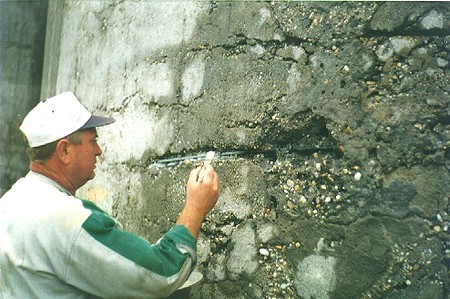A metal usually corrodes when it is in contact with both water and oxygen. Some metals corrode faster than others iron corrodes rapidly while gold hardly corrodes at all. The rate of corrosion can be increased by the presence of chemicals such as salt and sulphur dioxide, by an increase in temperature and by contact with other metals.
Around the home you usually prevent corrosion by painting the metal so protecting it against water and air. Indoors, it is generally good enough to use a general-purpose or metal primer and to keep the paintwork in reasonably good Condition. Outside on gutters, drainpipes, garden gates and metal window frames, for example you will have to think about dealing with any corrosion as soon as it appears and using a special corrosion-inhibiting primer.
Corrosion of metals containing iron is usually called rust, and once it gets a hold it is very difficult to eradicate. All unprotected metals containing iron rust rapidly and you should try to remove all traces of rust before you apply a primer. Painting over rust, even with bitumen, only hides the problem unless you use a rust-killing paint that will neutralise the existing rust and prevent further corrosion. You should consider whether the rusted item is worth renovating for example, badly rusted gutters and drainpipes can be cheaply and quickly replaced with plastic equivalents with the help of residential gutter services, which will need very little maintenance. If you want to change the gutter to a new one, hire expert gutter installers nearby to ensure that the installation is done correctly and efficiently. This will not only enhance the appearance of your home but also improve its overall drainage system, preventing potential water damage in the future. You may also hire an emergency flood services to ensure they address the issue immediately.

Rust can be removed with cither mechanical strippers a wire brush or an abrasive disc fitted to an electric drill or by hand. Cup brushes and wheel brushes lilted to an electric drill remove surface rust well but, for large areas, you are likely to get the best results with a silicon carbide disc. However, you should be prepared to replace the paper disc quite often. Using a wire brush by hand is a useful method of removing loose flaking rust, but wire wool is better for surface rust. Whatever method you use, internal corners are tricky to get at.
Once all the rust has been removed, carry out any repair work necessary a glass fibre patch, say and paint all the exposed metal surfaces with zinc chromate primer. Make sure that the primer is thoroughly dry before you paint over it. On metal gutters, you could use a bitumen paint which works by keeping out moisture so the paint film must be complete. However, you will not be able to paint over the bitumen unless you apply a coat of aluminium spirit-based scaler first.
Future rust can be kept at bay by thoroughly preparing the surface (and removing all existing rust) and using a rust-inhibiting primer followed by an undercoat and one or two topcoats.
Although some metals which do not contain iron notably aluminium and zinc – can corrode, none do so to a harmful extent. In fact, the corrosive film on some of these metals is beneficial it becomes a passive protective film over the metal below.
Although you do need to paint metals such as aluminium or zinc to preserve them, you may want to do so for decorative reasons. To paint aluminium, lightly rub down the oxidised surface layer use very fine abrasive paper or steel wool lubricated with white spirit and then use the appropriate primer.
Do not rub down zinc this will expose a ‘fresh’ zinc surface and primers do not stick well to ‘fresh” zinc. When you want to paint something which has a zinc coating over iron or steel, avoid any surface preparation (apart from cleaning) prior to painting any rubbing down may remove some of the zinc plating, especially on edges and corners. Zinc should be primed with a calcium plumbate primer.